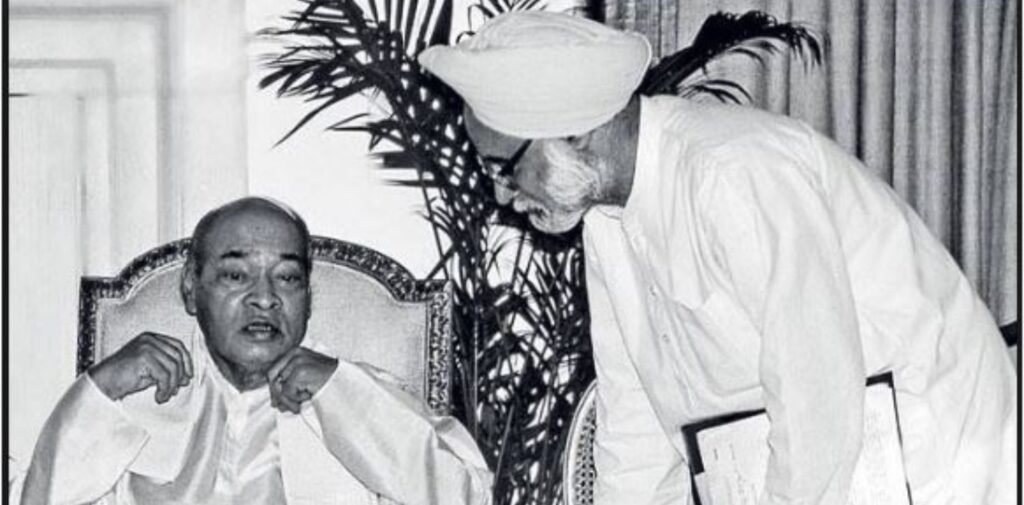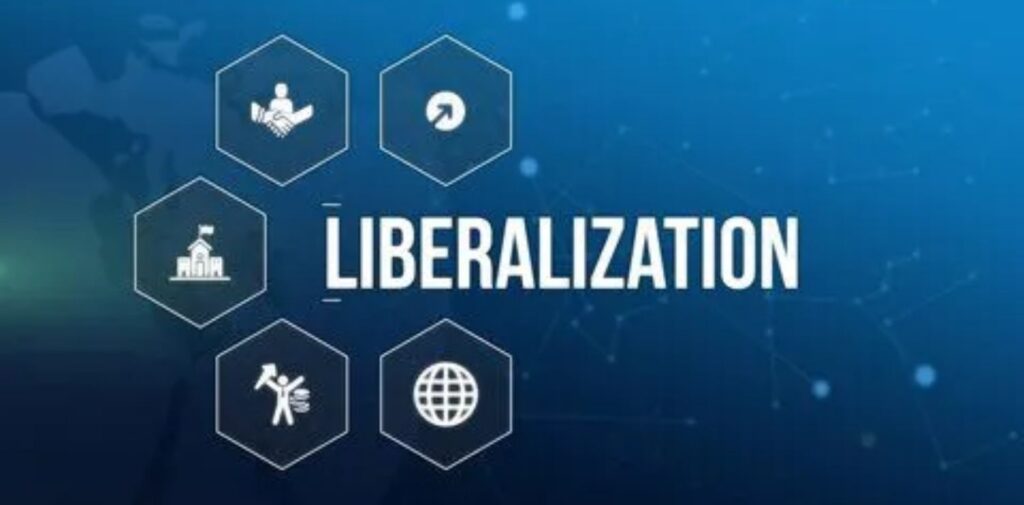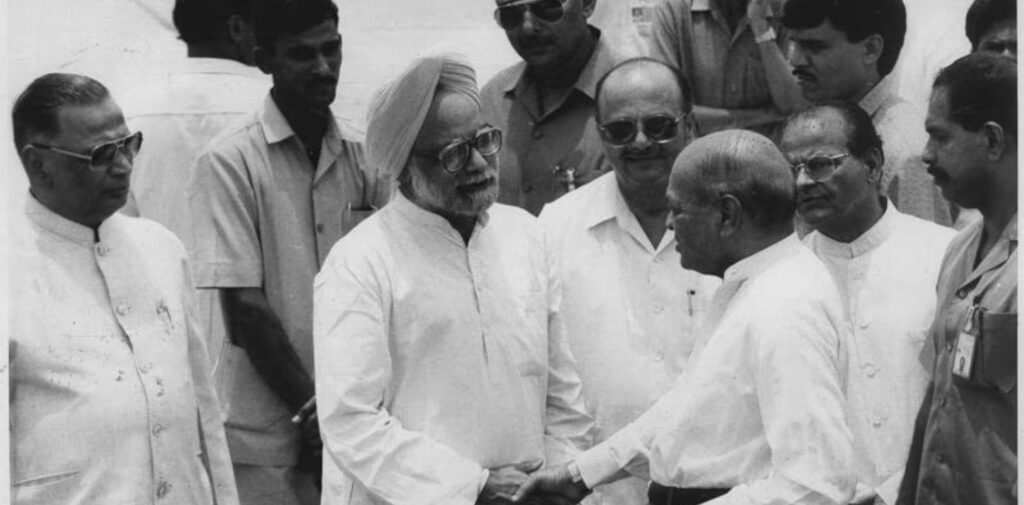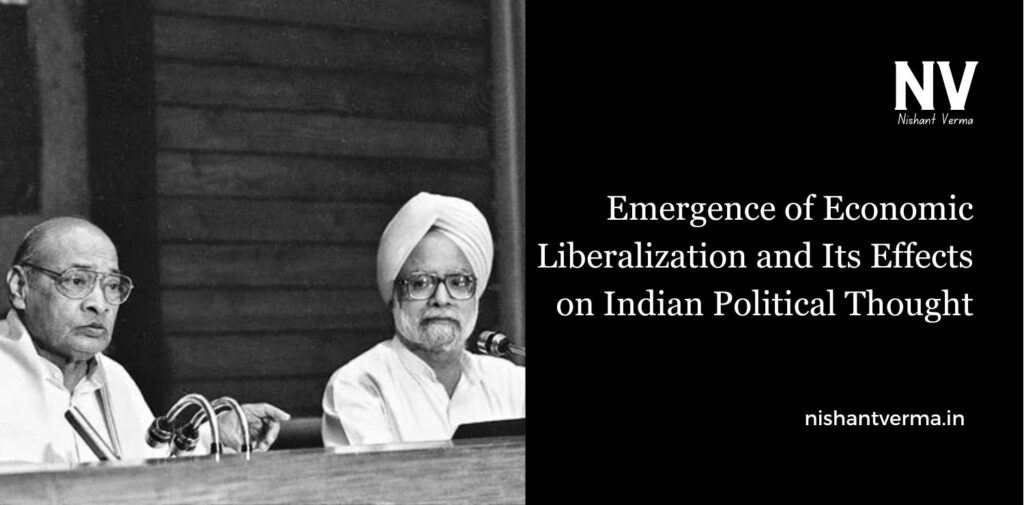In 1991, India made a big change to its economy, and this change is known as economic liberalization. It was a turning point for the country, not just economically, but politically as well. Before 1991, India’s economy was mostly controlled by the government. But after that, things began to change. India started opening up its economy to the outside world, giving more space for businesses to grow, and allowing people more freedom in how they spend and invest their money.
This change had a huge impact on Indian political thought, meaning the way political leaders, parties, and the people thought about politics and the economy. In this article, we will look at how economic liberalization came about and how it affected Indian politics.
What Is Economic Liberalization?
Before understanding its effects, we first need to know what economic liberalization means. It refers to the process of reducing government control over the economy and encouraging private businesses to grow. This includes things like:
- Opening up markets to international businesses.
- Reducing government regulations on industries.
- Encouraging foreign investment into the country.
- Privatizing state-run companies and allowing more competition.
In simple terms, economic liberalization meant that the Indian government decided to give businesses more freedom to operate, and to allow people to buy and sell goods and services from other countries more easily.

The Beginning of Economic Liberalization in 1991
India had faced many economic problems before 1991. The government’s policies of controlling businesses, industries, and trade made the economy slow and inefficient. There was not enough growth, and many people were poor. By the early 1990s, India was in a financial crisis. The country was running out of money, and there was a shortage of foreign goods.
To solve this problem, India decided to make big changes. In 1991, the then-Prime Minister, P.V. Narasimha Rao, and his finance minister, Dr. Manmohan Singh, introduced a series of reforms. These reforms were aimed at opening up the economy and allowing it to grow.
The key steps taken in 1991 were:
- Devaluation of the Rupee: The Indian currency was made weaker so that exports could become cheaper and more attractive to other countries.
- Reduction of Import Restrictions: The government stopped controlling which goods could be imported into India.
- Encouraging Foreign Investment: The government allowed foreign companies to set up businesses in India.
These reforms were the beginning of a new era in India’s economic journey.

Effects of Economic Liberalization on the Economy
Economic liberalization brought many changes to India’s economy. Let’s look at some of the major effects:
- Rapid Economic Growth: After liberalization, India’s economy started to grow faster. More businesses were set up, both by Indian entrepreneurs and foreign companies. India’s middle class began to grow, and many people found new jobs. The country became one of the world’s fastest-growing economies.
- Increased Global Trade: As India opened up its economy, it started trading more with other countries. India’s products, like clothes, technology, and food, were now sold in other parts of the world. In turn, people in India could buy products from foreign countries, which made many things cheaper and better quality.
- Rise of Technology and IT: One of the biggest changes was the rise of the Information Technology (IT) sector. Many international companies set up their offices in India, and Indian companies started providing IT services to countries like the United States and Europe. Cities like Bangalore became famous for their tech industries.
- Changes in Agriculture and Industry: Economic liberalization also affected agriculture and industry. The government reduced its control over these sectors, allowing farmers and industries to make their own decisions. This helped increase production and efficiency.

Effects of Economic Liberalization on Indian Political Thought
Economic liberalization didn’t just change the economy—it also influenced the way Indian politicians and the public thought about politics and governance. Here are some of the important changes:
- Rise of Market-Friendly Politics: Before 1991, the Indian government believed that it should control most of the economy. This was called socialist thinking, where the government controlled industries and resources to ensure fairness. However, after 1991, political leaders started to believe more in the market economy—where businesses and the private sector play a bigger role. Political leaders began supporting policies that helped businesses grow and encouraged competition. Parties started thinking less about government control and more about creating opportunities for private businesses and foreign investors.
- Emergence of New Political Parties and Movements: As the economy changed, new political parties and movements also emerged. Some political groups, like the Bharatiya Janata Party (BJP), strongly supported economic reforms. They believed that economic liberalization would make India stronger and more modern. These parties also encouraged foreign investment and supported global trade. At the same time, there were other parties that were concerned about the poor and the working class. They worried that liberalization would hurt the poor and increase inequality. This led to new political debates about how to balance growth and fairness.
- Shift in Political Alliances: Political alliances also began to change. In the early years of liberalization, there was a push from the ruling government to form alliances with businesses and industries. These alliances helped grow the economy, but they also led to criticisms that the government was favoring the rich and big companies over the poor. On the other hand, political parties focused on welfare programs for the poor began to question whether liberalization was benefiting all sections of society. These parties pushed for policies that would ensure the poor had access to healthcare, education, and employment opportunities.
- Changes in Voter Expectations: With the growth of the economy, people started expecting more from the government. Voters wanted better infrastructure, better jobs, and more opportunities. They wanted the government to create a business-friendly environment while also taking care of the poor. Political leaders now had to balance the demands of the business community with the needs of the common people. This created a new way of thinking in Indian politics—one that focused on economic growth, but also on ensuring that growth reached everyone.
- Focus on Globalization and National Interests: Economic liberalization brought India closer to the global economy. This led to a shift in political thought, where political leaders had to think not only about local issues but also about India’s position in the world. The idea of globalization became important, and India started to see itself as a key player in international trade, politics, and economics.
Conclusion: A New Era in Indian Politics
The emergence of economic liberalization in 1991 marked a significant change in India’s political and economic landscape. The economy grew rapidly, businesses flourished, and new political ideas emerged. While economic liberalization brought many benefits, it also raised new challenges, such as inequality and concerns for the poor.
Politically, it reshaped the way leaders and parties thought about governance. It encouraged more focus on business growth, globalization, and attracting foreign investment. But it also reminded leaders that they needed to care for the poor and ensure that the benefits of growth were shared by all.
India’s political thought evolved as a result of liberalization, and the debate about the right balance between growth and fairness continues to shape Indian politics even today. The future of Indian politics will be defined by how the country continues to navigate the path of economic growth while ensuring that no one is left behind.




